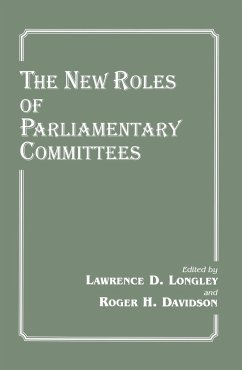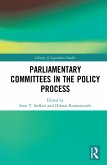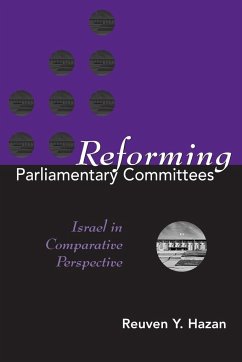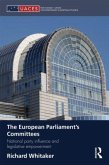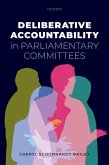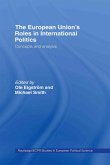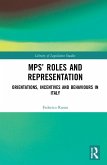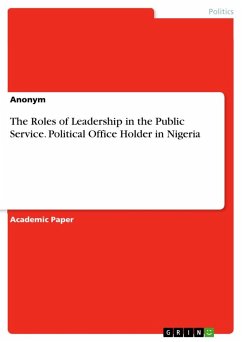Davidson / Lawrence D. Longley (eds.)
The New Roles of Parliamentary Committees
Herausgeber: Davidson; Longley, Lawrence D.
Davidson / Lawrence D. Longley (eds.)
The New Roles of Parliamentary Committees
Herausgeber: Davidson; Longley, Lawrence D.
- Gebundenes Buch
- Merkliste
- Auf die Merkliste
- Bewerten Bewerten
- Teilen
- Produkt teilen
- Produkterinnerung
- Produkterinnerung
Parliaments had been expected to decline in significance at the end of the 20th century, but instead they have developed new and vital political roles and have innovated their institutional structure in parliamentary committees, not only in a few parliaments, but as a global phenomenon.
Andere Kunden interessierten sich auch für
![Parliamentary Committees in the Policy Process Parliamentary Committees in the Policy Process]() Parliamentary Committees in the Policy Process199,99 €
Parliamentary Committees in the Policy Process199,99 €![REFORMING PARLIAMENTARY COMMITTEES REFORMING PARLIAMENTARY COMMITTEES]() Reuven Y. HazanREFORMING PARLIAMENTARY COMMITTEES37,99 €
Reuven Y. HazanREFORMING PARLIAMENTARY COMMITTEES37,99 €![The European Parliament's Committees The European Parliament's Committees]() Richard WhitakerThe European Parliament's Committees209,99 €
Richard WhitakerThe European Parliament's Committees209,99 €![Deliberative Accountability in Parliamentary Committees Deliberative Accountability in Parliamentary Committees]() Cheryl Schonhardt-BaileyDeliberative Accountability in Parliamentary Committees126,99 €
Cheryl Schonhardt-BaileyDeliberative Accountability in Parliamentary Committees126,99 €![The European Union's Roles in International Politics The European Union's Roles in International Politics]() Ole Elgström / Michael Smith (eds.)The European Union's Roles in International Politics209,99 €
Ole Elgström / Michael Smith (eds.)The European Union's Roles in International Politics209,99 €![MPs' Roles and Representation MPs' Roles and Representation]() Federico RussoMPs' Roles and Representation198,99 €
Federico RussoMPs' Roles and Representation198,99 €![The Roles of Leadership in the Public Service. Political Office Holder in Nigeria The Roles of Leadership in the Public Service. Political Office Holder in Nigeria]() AnonymousThe Roles of Leadership in the Public Service. Political Office Holder in Nigeria27,95 €
AnonymousThe Roles of Leadership in the Public Service. Political Office Holder in Nigeria27,95 €-
-
-
Parliaments had been expected to decline in significance at the end of the 20th century, but instead they have developed new and vital political roles and have innovated their institutional structure in parliamentary committees, not only in a few parliaments, but as a global phenomenon.
Hinweis: Dieser Artikel kann nur an eine deutsche Lieferadresse ausgeliefert werden.
Hinweis: Dieser Artikel kann nur an eine deutsche Lieferadresse ausgeliefert werden.
Produktdetails
- Produktdetails
- Verlag: Routledge
- Seitenzahl: 264
- Erscheinungstermin: 30. Juni 1998
- Englisch
- Abmessung: 235mm x 157mm x 20mm
- Gewicht: 584g
- ISBN-13: 9780714648910
- ISBN-10: 0714648914
- Artikelnr.: 21741140
- Herstellerkennzeichnung
- Libri GmbH
- Europaallee 1
- 36244 Bad Hersfeld
- gpsr@libri.de
- Verlag: Routledge
- Seitenzahl: 264
- Erscheinungstermin: 30. Juni 1998
- Englisch
- Abmessung: 235mm x 157mm x 20mm
- Gewicht: 584g
- ISBN-13: 9780714648910
- ISBN-10: 0714648914
- Artikelnr.: 21741140
- Herstellerkennzeichnung
- Libri GmbH
- Europaallee 1
- 36244 Bad Hersfeld
- gpsr@libri.de
Longley Lawrence D., Roger H. Daivdson
Chapter 1 Parliamentary Committees: Changing Perspectives on Changing
Institutions This essay reflects the intellectual stimulation of the
Parliamentary Committee Initiative, and has Particularly benefited from the
comments and scholarship of the members of the Initiative's International
Steering Committee. Besides Lawrence D. Longley and Roger H. Davidson,
these scholars include Attila Ágh, Philip Norton, David M. Olson, Malcolm
Shaw, Barbara Sinclair, Kaare Strøm, Wlodzimierz Wesolowski, and Drago
Zajc. Valuable and greatly appreciated support was provided to this project
by the Dean of the Faculty of Lawrence University in the form of Lawrence
University Faculty Research Grants in 1996 and 1997; this assistance
greatly facilitated the writing and editing of this work from venues as
disparate as Appleton, Wisconsin, Washington, DC, and Budapest, Hungary.,
Lawrence D. Longley, Roger H. Davidson; Chapter 2 Parliamentary Committees
in European Democracies This article is based on collaborative research
with Ingvar Mattson within the research project on 'Parliaments and
Majority Rule in Western Europe', directed by Herbert Döring. I gratefully
acknowledge my debts to my co-author, to the project director, to Elvira
Scholz, and to Jenny Santelmann Post for assistance in data collection and
analysis, and to all the country specialists who patiently answered our
questionnaire and later checked the accuracy of the data. This research was
conducted in Part while I was a William C. Bark National Fellow at the
Hoover Institution on War, Revolution, and Peace at Stanford University. I
thank Hoover for its hospitality and support., Kaarre Strom; Chapter 3
Norwegian Parliamentary Committees: Performance, Structural Change and
External Relations The author would like to thank Sandra Halverson, Per
Laegreid, Paul G. Roness and John-Erik Aagotnes for their invaluable
assistance and advice., Hilmar Rommetvedt; Chapter 4 Changing Parliamentary
Committees in Changing East-Central Europe: Parliamentary Committees as
Central Sites of Policy Making, Attila Ágh; Chapter 5 Committees in the
Post-Communist Polish Sejm: Structure, Activity and Members, David M.
Olson, Ania Van Der Meer-Krok-Paszkowska, Maurice D. Simon, Irena
Jackiewicz; Chapter 6 US Congressional Committees: Changing Legislative
Workshops The authors would like to thank Christopher J. Deering for
providing helpful suggestions and comments on drafts of this study., Colton
C. Campbell, Roger H. Davidson; Chapter 7 Nascent Institutionalisation:
Committees in the British Parliament, Philip Norton; Chapter 8 Political
Reform and the Committee System in Israel: Structural and Functional
Adaptation The author is grateful to the Israel Democracy Institute for its
generous support for this research, and to Lawrence D. Longley for his
valuable comments on numerous drafts., Reuven Y. Hazan; Chapter 9
Committees in the Russian State Duma: Continuity and Change in Comparative
Perspective The author wishes to thank Tom Remington, Vin Moscardelli, Kyle
Saunders, Richard Wike, and the editors for helpful comments. Also those
deputies and staff members of the State Duma who gave of their time to make
this research possible, as well as Ms Irina Andreeva, Director of the
Parliamentary Library of the Russian Federation, for her hospitality. This
research was sponsored in Part by the International Research Exchanges
Board. None of the above bears any responsibility for the contents of this
paper., Moshe Haspel; Chapter 10 The Organisation and Workings of
Committees in the Korean National Assembly The author would like to
acknowledge the financial support of the Research Fund of Seoul National
University for the research on which this article is based., Chan Wook
Park; Chapter 11 Parliamentary Committees: A Global Perspective, Malcolm
Shaw;
Institutions This essay reflects the intellectual stimulation of the
Parliamentary Committee Initiative, and has Particularly benefited from the
comments and scholarship of the members of the Initiative's International
Steering Committee. Besides Lawrence D. Longley and Roger H. Davidson,
these scholars include Attila Ágh, Philip Norton, David M. Olson, Malcolm
Shaw, Barbara Sinclair, Kaare Strøm, Wlodzimierz Wesolowski, and Drago
Zajc. Valuable and greatly appreciated support was provided to this project
by the Dean of the Faculty of Lawrence University in the form of Lawrence
University Faculty Research Grants in 1996 and 1997; this assistance
greatly facilitated the writing and editing of this work from venues as
disparate as Appleton, Wisconsin, Washington, DC, and Budapest, Hungary.,
Lawrence D. Longley, Roger H. Davidson; Chapter 2 Parliamentary Committees
in European Democracies This article is based on collaborative research
with Ingvar Mattson within the research project on 'Parliaments and
Majority Rule in Western Europe', directed by Herbert Döring. I gratefully
acknowledge my debts to my co-author, to the project director, to Elvira
Scholz, and to Jenny Santelmann Post for assistance in data collection and
analysis, and to all the country specialists who patiently answered our
questionnaire and later checked the accuracy of the data. This research was
conducted in Part while I was a William C. Bark National Fellow at the
Hoover Institution on War, Revolution, and Peace at Stanford University. I
thank Hoover for its hospitality and support., Kaarre Strom; Chapter 3
Norwegian Parliamentary Committees: Performance, Structural Change and
External Relations The author would like to thank Sandra Halverson, Per
Laegreid, Paul G. Roness and John-Erik Aagotnes for their invaluable
assistance and advice., Hilmar Rommetvedt; Chapter 4 Changing Parliamentary
Committees in Changing East-Central Europe: Parliamentary Committees as
Central Sites of Policy Making, Attila Ágh; Chapter 5 Committees in the
Post-Communist Polish Sejm: Structure, Activity and Members, David M.
Olson, Ania Van Der Meer-Krok-Paszkowska, Maurice D. Simon, Irena
Jackiewicz; Chapter 6 US Congressional Committees: Changing Legislative
Workshops The authors would like to thank Christopher J. Deering for
providing helpful suggestions and comments on drafts of this study., Colton
C. Campbell, Roger H. Davidson; Chapter 7 Nascent Institutionalisation:
Committees in the British Parliament, Philip Norton; Chapter 8 Political
Reform and the Committee System in Israel: Structural and Functional
Adaptation The author is grateful to the Israel Democracy Institute for its
generous support for this research, and to Lawrence D. Longley for his
valuable comments on numerous drafts., Reuven Y. Hazan; Chapter 9
Committees in the Russian State Duma: Continuity and Change in Comparative
Perspective The author wishes to thank Tom Remington, Vin Moscardelli, Kyle
Saunders, Richard Wike, and the editors for helpful comments. Also those
deputies and staff members of the State Duma who gave of their time to make
this research possible, as well as Ms Irina Andreeva, Director of the
Parliamentary Library of the Russian Federation, for her hospitality. This
research was sponsored in Part by the International Research Exchanges
Board. None of the above bears any responsibility for the contents of this
paper., Moshe Haspel; Chapter 10 The Organisation and Workings of
Committees in the Korean National Assembly The author would like to
acknowledge the financial support of the Research Fund of Seoul National
University for the research on which this article is based., Chan Wook
Park; Chapter 11 Parliamentary Committees: A Global Perspective, Malcolm
Shaw;
Chapter 1 Parliamentary Committees: Changing Perspectives on Changing
Institutions This essay reflects the intellectual stimulation of the
Parliamentary Committee Initiative, and has Particularly benefited from the
comments and scholarship of the members of the Initiative's International
Steering Committee. Besides Lawrence D. Longley and Roger H. Davidson,
these scholars include Attila Ágh, Philip Norton, David M. Olson, Malcolm
Shaw, Barbara Sinclair, Kaare Strøm, Wlodzimierz Wesolowski, and Drago
Zajc. Valuable and greatly appreciated support was provided to this project
by the Dean of the Faculty of Lawrence University in the form of Lawrence
University Faculty Research Grants in 1996 and 1997; this assistance
greatly facilitated the writing and editing of this work from venues as
disparate as Appleton, Wisconsin, Washington, DC, and Budapest, Hungary.,
Lawrence D. Longley, Roger H. Davidson; Chapter 2 Parliamentary Committees
in European Democracies This article is based on collaborative research
with Ingvar Mattson within the research project on 'Parliaments and
Majority Rule in Western Europe', directed by Herbert Döring. I gratefully
acknowledge my debts to my co-author, to the project director, to Elvira
Scholz, and to Jenny Santelmann Post for assistance in data collection and
analysis, and to all the country specialists who patiently answered our
questionnaire and later checked the accuracy of the data. This research was
conducted in Part while I was a William C. Bark National Fellow at the
Hoover Institution on War, Revolution, and Peace at Stanford University. I
thank Hoover for its hospitality and support., Kaarre Strom; Chapter 3
Norwegian Parliamentary Committees: Performance, Structural Change and
External Relations The author would like to thank Sandra Halverson, Per
Laegreid, Paul G. Roness and John-Erik Aagotnes for their invaluable
assistance and advice., Hilmar Rommetvedt; Chapter 4 Changing Parliamentary
Committees in Changing East-Central Europe: Parliamentary Committees as
Central Sites of Policy Making, Attila Ágh; Chapter 5 Committees in the
Post-Communist Polish Sejm: Structure, Activity and Members, David M.
Olson, Ania Van Der Meer-Krok-Paszkowska, Maurice D. Simon, Irena
Jackiewicz; Chapter 6 US Congressional Committees: Changing Legislative
Workshops The authors would like to thank Christopher J. Deering for
providing helpful suggestions and comments on drafts of this study., Colton
C. Campbell, Roger H. Davidson; Chapter 7 Nascent Institutionalisation:
Committees in the British Parliament, Philip Norton; Chapter 8 Political
Reform and the Committee System in Israel: Structural and Functional
Adaptation The author is grateful to the Israel Democracy Institute for its
generous support for this research, and to Lawrence D. Longley for his
valuable comments on numerous drafts., Reuven Y. Hazan; Chapter 9
Committees in the Russian State Duma: Continuity and Change in Comparative
Perspective The author wishes to thank Tom Remington, Vin Moscardelli, Kyle
Saunders, Richard Wike, and the editors for helpful comments. Also those
deputies and staff members of the State Duma who gave of their time to make
this research possible, as well as Ms Irina Andreeva, Director of the
Parliamentary Library of the Russian Federation, for her hospitality. This
research was sponsored in Part by the International Research Exchanges
Board. None of the above bears any responsibility for the contents of this
paper., Moshe Haspel; Chapter 10 The Organisation and Workings of
Committees in the Korean National Assembly The author would like to
acknowledge the financial support of the Research Fund of Seoul National
University for the research on which this article is based., Chan Wook
Park; Chapter 11 Parliamentary Committees: A Global Perspective, Malcolm
Shaw;
Institutions This essay reflects the intellectual stimulation of the
Parliamentary Committee Initiative, and has Particularly benefited from the
comments and scholarship of the members of the Initiative's International
Steering Committee. Besides Lawrence D. Longley and Roger H. Davidson,
these scholars include Attila Ágh, Philip Norton, David M. Olson, Malcolm
Shaw, Barbara Sinclair, Kaare Strøm, Wlodzimierz Wesolowski, and Drago
Zajc. Valuable and greatly appreciated support was provided to this project
by the Dean of the Faculty of Lawrence University in the form of Lawrence
University Faculty Research Grants in 1996 and 1997; this assistance
greatly facilitated the writing and editing of this work from venues as
disparate as Appleton, Wisconsin, Washington, DC, and Budapest, Hungary.,
Lawrence D. Longley, Roger H. Davidson; Chapter 2 Parliamentary Committees
in European Democracies This article is based on collaborative research
with Ingvar Mattson within the research project on 'Parliaments and
Majority Rule in Western Europe', directed by Herbert Döring. I gratefully
acknowledge my debts to my co-author, to the project director, to Elvira
Scholz, and to Jenny Santelmann Post for assistance in data collection and
analysis, and to all the country specialists who patiently answered our
questionnaire and later checked the accuracy of the data. This research was
conducted in Part while I was a William C. Bark National Fellow at the
Hoover Institution on War, Revolution, and Peace at Stanford University. I
thank Hoover for its hospitality and support., Kaarre Strom; Chapter 3
Norwegian Parliamentary Committees: Performance, Structural Change and
External Relations The author would like to thank Sandra Halverson, Per
Laegreid, Paul G. Roness and John-Erik Aagotnes for their invaluable
assistance and advice., Hilmar Rommetvedt; Chapter 4 Changing Parliamentary
Committees in Changing East-Central Europe: Parliamentary Committees as
Central Sites of Policy Making, Attila Ágh; Chapter 5 Committees in the
Post-Communist Polish Sejm: Structure, Activity and Members, David M.
Olson, Ania Van Der Meer-Krok-Paszkowska, Maurice D. Simon, Irena
Jackiewicz; Chapter 6 US Congressional Committees: Changing Legislative
Workshops The authors would like to thank Christopher J. Deering for
providing helpful suggestions and comments on drafts of this study., Colton
C. Campbell, Roger H. Davidson; Chapter 7 Nascent Institutionalisation:
Committees in the British Parliament, Philip Norton; Chapter 8 Political
Reform and the Committee System in Israel: Structural and Functional
Adaptation The author is grateful to the Israel Democracy Institute for its
generous support for this research, and to Lawrence D. Longley for his
valuable comments on numerous drafts., Reuven Y. Hazan; Chapter 9
Committees in the Russian State Duma: Continuity and Change in Comparative
Perspective The author wishes to thank Tom Remington, Vin Moscardelli, Kyle
Saunders, Richard Wike, and the editors for helpful comments. Also those
deputies and staff members of the State Duma who gave of their time to make
this research possible, as well as Ms Irina Andreeva, Director of the
Parliamentary Library of the Russian Federation, for her hospitality. This
research was sponsored in Part by the International Research Exchanges
Board. None of the above bears any responsibility for the contents of this
paper., Moshe Haspel; Chapter 10 The Organisation and Workings of
Committees in the Korean National Assembly The author would like to
acknowledge the financial support of the Research Fund of Seoul National
University for the research on which this article is based., Chan Wook
Park; Chapter 11 Parliamentary Committees: A Global Perspective, Malcolm
Shaw;

